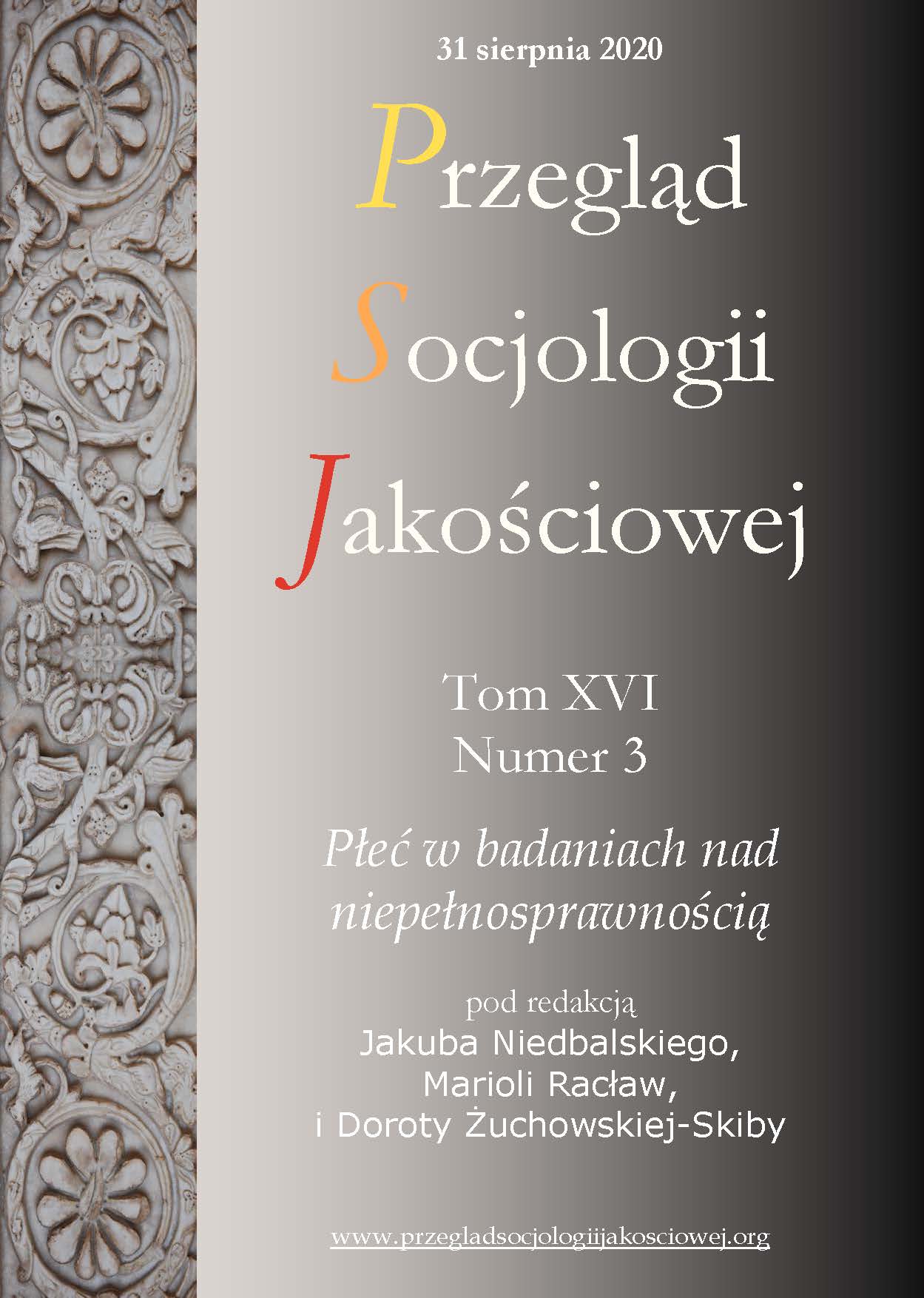Who is Allowed to Go on a Date? About the Sexuality of People with Disabilities
DOI:
https://doi.org/10.18778/1733-8069.16.3.04Keywords:
disability, sexuality, relationships, symbolic interactionismAbstract
Sexuality is an inseparable part of our life and identity. The most of the population was born – and lives as – sexually significant, apart from the group of people who are described as asexual. The laws of biology, however, are not always defined in the same way as socially constructed meanings. Do women with disabilities have the right to go on a date? What barriers do they need to struggle with when they decide to have children? Can they care about their sexual needs? What sexual activities are described by socially acceptable sex scripts? I will try to answer these questions on the basis of literature analysis as well as my own research results. My research was carried out on a group of women living with disabilities (multiple sclerosis) and their partners, as well as with a group of people who have no daily contact with people with disabilities.
Downloads
References
Bourdieu Pierre (2005) Dystynkcja. Społeczna krytyka władzy sądzenia. Przełożył Piotr Biłos. Warszawa: Wydawnictwo Naukowe Scholar.
Google Scholar
Deklaracja praw seksualnych (2003) „Seksuologia Polska”, t. 1, nr 1, s. 1−2.
Google Scholar
Foucault Michel (1998) Podmiot i władza. „Lewą Nogą”, nr 9, s. 174–192.
Google Scholar
DOI: https://doi.org/10.3828/cfc.1985.9.2.003
Freud Sigmund (1999) Trzy rozprawy z teorii seksualnej [w:] Freud Sigmund, Życie seksualne. Warszawa: Wydawnictwo KR, s. 37−54.
Google Scholar
Fundacja Kulawa Warszawa (2019) Przychodzi baba do lekarza [dostęp 2 lutego 2020 r.]. Dostępny w Internecie: https://www.kulawawarszawa.pl/wp-content/uploads/2019/03/Fundacja_Kulawa_Warszawa_dost%C4%99pno%C5%9B%C4%87_gabi-net%C3%B3w_ginekologicznych.pdf
Google Scholar
Gagnon John, Simon William (1973) Sexual conduct. The social sources of human sexuality. Chicago: Aldine.
Google Scholar
Glaser Barney G., Strauss Anselm L. (2016) Świadomość umierania. Przełożył Paweł Tomanek. Kraków: Zakład Wydawniczy Nomos.
Google Scholar
Goffman Erving (2005) Piętno. Przełożyły Aleksandra Dzierżyńska, Joanna Tokarska-Bakir. Gdańsk: Gdańskie Wydawnictwo Psychologiczne.
Google Scholar
Hawkes Gail (2002) A sociology of sex and sexuality. Philadelphia: Open University Press.
Google Scholar
Hinc-Wirkus Magdalena (2017) „Upośledzony” seks, czyli o seksualności osób z niepełnosprawnością w Polsce. „Czasopismo Pedagogiczne”, t. 1, s. 22–29.
Google Scholar
Hunt Xanthe (2017) Dating persons with physical disabilities: the perceptions of South Africans without disabilities. „Culture, Health and Sexuality”, vol. 20, s. 141–155.
Google Scholar
DOI: https://doi.org/10.1080/13691058.2017.1334964
Kochanowski Jacek (2013) Socjologia seksualności. Marginesy. Warszawa: Wydawnictwo Naukowe PWN.
Google Scholar
Konecki Krzysztof (2000) Studia z metodologii badań jakościowych. Teoria ugruntowana. Warszawa: Wydawnictwo Naukowe PWN.
Google Scholar
Nguyen Thi T. A. (2019) Sexual experiences of people with physical disabilities in Vietnam. „Sexuality and Disability”, vol. 37, s. 25–39.
Google Scholar
DOI: https://doi.org/10.1007/s11195-018-09557-0
Niedbalski Jakub, Racław Mariola, Żuchowska-Skiba Dorota (2017) Wstęp. W kierunku nowego paradygmatu niepełnosprawności. „Acta Universitatis Lodziensis”, t. 60, s. 5–12.
Google Scholar
DOI: https://doi.org/10.18778/0208-600X.60.01
Polskie Towarzystwo Stwardnienia Rozsianego (2006) SM i najważniejsze fakty. Warszawa: Polskie Towarzystwo Stwardnienia Rozsianego.
Google Scholar
Rubin Gayle (2004) Rozmyślając o seksie: zapiski o sprawie radykalnej teorii polityki seksualności. Przełożyła Joanna Mizielińska. „Lewą nogą”, t. 16, s. 164–224.
Google Scholar
Rzeźnicka-Krupa Joanna (2019) Społeczne ontologie niepełnosprawności. Ciało. Tożsamość. Performatywność. Kraków: Wydawnictwo Impuls.
Google Scholar
Santos Ana C, Santos Ana L. (2018) Yes, we fuck! Challenging the misfit sexual body through disabled women’s narratives. „Sexualities”, vol. 21, s. 303–318.
Google Scholar
DOI: https://doi.org/10.1177/1363460716688680
Seidman Steven (2012) Społeczne tworzenie seksualności. Przełożył Paweł Tomanek. Warszawa: Wydawnictwo Naukowe PWN.
Google Scholar
Shakespeare Tom (2000) Disabled Sexuality: Toward Rights and Recognition. „Sexuality and Disability”, vol. 18, s. 159–166.
Google Scholar
DOI: https://doi.org/10.1023/A:1026409613684
Siebers Tobin (2012) A sexual culture for disabled people [w:] McRuer Robert, Mollow Anna, red., Sex and Disability. London: Duke University Press, s. 37–53.
Google Scholar
DOI: https://doi.org/10.2307/j.ctv11smzjb.5
Smith Rainey Sarah (2018) The pleasures of care. „Sexualities”, vol. 21, s. 271–286.
Google Scholar
DOI: https://doi.org/10.1177/1363460716688677
Tarasoff Lesley A. (2015) Experiences of Women With Physical Disabilities During the Perinatal Period: A Review of the Literature and Recommendations to Improve Care. „Health Care for Women International”, vol. 36, s. 88–107.
Google Scholar
DOI: https://doi.org/10.1080/07399332.2013.815756
Tepper Mitchell S. (2000) Sexuality and Disability: The Missing Discourse of Pleasure. „Sexuality and Disability”, vol. 18, s. 283–290.
Google Scholar
DOI: https://doi.org/10.1023/A:1005698311392
Walentynowicz Halina (2018) Społeczne prognozy Marksa. „Przegląd Filozoficzny – Nowa Seria”, nr 4, s. 203–216.
Google Scholar
Wendell Susan (1989) Toward a feminist theory of disability. „Hypatia”, vol. 4, no. 2, s. 104–124.
Google Scholar
DOI: https://doi.org/10.1111/j.1527-2001.1989.tb00576.x
Wiliński Mateusz (2010) Modele niepełnosprawności: indywidualny – funkcjonalny – społeczny [w:] Anna Brzezińska, Radosław Kaczan, Karolina Smoczyńska, red., Diagnoza potrzeb i modele pomocy dla osób z ograniczeniami sprawności. Warszawa: Scholar, s. 15–59.
Google Scholar
Downloads
Published
How to Cite
Issue
Section
License

This work is licensed under a Creative Commons Attribution-NonCommercial-NoDerivatives 4.0 International License.














